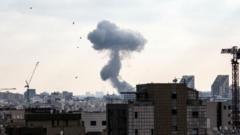This article explores the implications of the US airstrikes, the regional responses, and contrasting perspectives from various political players and nations.
**US Bombs Iranian Nuclear Facilities: A Game Changer in Middle Eastern Tensions**

**US Bombs Iranian Nuclear Facilities: A Game Changer in Middle Eastern Tensions**
The recent US airstrike on Iranian nuclear sites has ignited a complex geopolitical crisis, pitting major global players against each other in a battle of narratives and strategies.
The US military has conducted significant airstrikes on three critical Iranian nuclear facilities: Fordo, Natanz, and Isfahan. President Donald Trump described the operation as "successful," claiming that the sites were "obliterated." As of now, the Pentagon has yet to assess the full extent of the damage incurred, though initial reports express that all targeted facilities sustained severe destruction. Israel, integral to planning the strikes, stated its commitment to regional security alongside US forces. In contrast, Iranian officials disputed these claims, asserting that they had evacuated critical materials and thus averting a catastrophic setback.
Operation Midnight Hammer, executed with 125 US military aircraft, demonstrated a high level of sophistication, including the use of Tomahawk cruise missiles and GBU-57 Massive Ordnance Penetrators specifically designed to penetrate fortified structures. Gen. Dan Caine, Chairman of the Joint Chiefs of Staff, indicated that the operations were meticulously planned to avoid civilian and military Iranian casualties directly, maintaining it was "not about regime change."
Satellite images from Maxar Technologies revealed damage at the Fordo site, portending significant impacts on Iran's nuclear capabilities. The Iranian Atomic Energy Organization condemned the US action as a "barbaric violation" of international law, yet international monitors, including the IAEA and Saudi Arabia, reported no radiation spikes following the strikes.
In the immediate aftermath, Iran retaliated with missile strikes targeting Israel, intensifying existing tensions. Iranian President Masoud Pezeshkian asserted that the US must be held accountable for its "aggression," while military analysts speculate various strategic responses available to Tehran, ranging from retaliation to diplomatic engagements.
Politically, reactions within the US are mixed. While many Republican lawmakers support Trump's actions, others, including Congress members and Democrats, have expressed concerns about bypassing Congress and the risk of further entangling the US in another Middle Eastern war. Democratic leaders criticized the potential for escalating conflict, stressing the need for diplomacy.
Globally, reactions varied widely. The UK, France, and Germany urged Iran to refrain from escalating violence, while leaders from Russia and India advocated for diplomatic solutions. Several nations voiced concern over the precarious state of security in the region, marking a significant divergence in international perspectives on the conflict.
In summary, the latest US strikes on Iranian nuclear facilities mark a dramatic escalation in the ongoing conflict between the US, Israel, and Iran. The differing narratives and political ramifications reveal a complex web of international relations that will undoubtedly evolve as all parties navigate this turbulent arena.
Operation Midnight Hammer, executed with 125 US military aircraft, demonstrated a high level of sophistication, including the use of Tomahawk cruise missiles and GBU-57 Massive Ordnance Penetrators specifically designed to penetrate fortified structures. Gen. Dan Caine, Chairman of the Joint Chiefs of Staff, indicated that the operations were meticulously planned to avoid civilian and military Iranian casualties directly, maintaining it was "not about regime change."
Satellite images from Maxar Technologies revealed damage at the Fordo site, portending significant impacts on Iran's nuclear capabilities. The Iranian Atomic Energy Organization condemned the US action as a "barbaric violation" of international law, yet international monitors, including the IAEA and Saudi Arabia, reported no radiation spikes following the strikes.
In the immediate aftermath, Iran retaliated with missile strikes targeting Israel, intensifying existing tensions. Iranian President Masoud Pezeshkian asserted that the US must be held accountable for its "aggression," while military analysts speculate various strategic responses available to Tehran, ranging from retaliation to diplomatic engagements.
Politically, reactions within the US are mixed. While many Republican lawmakers support Trump's actions, others, including Congress members and Democrats, have expressed concerns about bypassing Congress and the risk of further entangling the US in another Middle Eastern war. Democratic leaders criticized the potential for escalating conflict, stressing the need for diplomacy.
Globally, reactions varied widely. The UK, France, and Germany urged Iran to refrain from escalating violence, while leaders from Russia and India advocated for diplomatic solutions. Several nations voiced concern over the precarious state of security in the region, marking a significant divergence in international perspectives on the conflict.
In summary, the latest US strikes on Iranian nuclear facilities mark a dramatic escalation in the ongoing conflict between the US, Israel, and Iran. The differing narratives and political ramifications reveal a complex web of international relations that will undoubtedly evolve as all parties navigate this turbulent arena.























